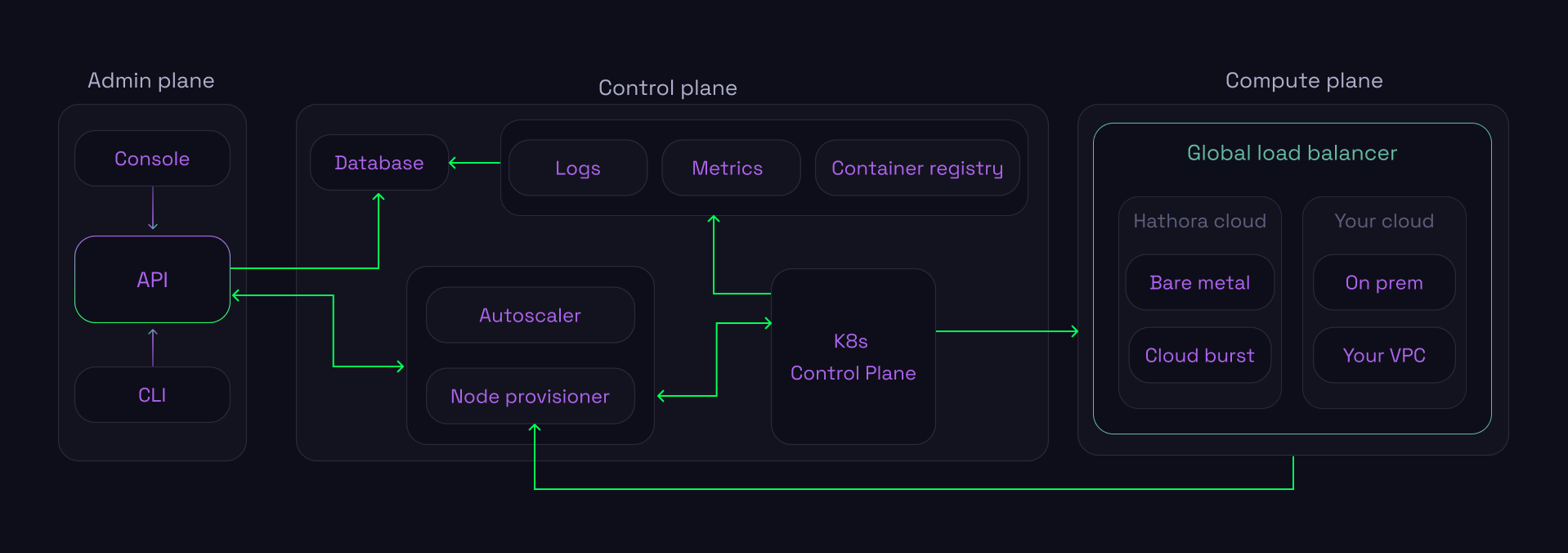Platform architecture
Hathora is a hybrid cloud orchestration platform that unifies GPU and CPU compute across bare metal, cloud, and on-premises infrastructure into a single elastic resource pool. Simply provide a dockerfile and Hathora handles global deployment, intelligent routing, and automatic scaling across your entire infrastructure footprint.
Unlike traditional multi-cloud approaches that create isolated resource silos, Hathora treats all compute as fungible, eliminating capacity constraints, single points of failure, and operational overhead.

Admin plane
The Usage Layer provides multiple interfaces for interacting with Hathora's platform across different development workflows.
- Hathora Console is a web interface for manual deployment and fleet management, ideal for getting started
- REST API to programmatic access to all platform functionality, enabling integration with game backends and CI/CD pipelines for dynamic room creation and lifecycle management
- SDKs for language-specific libraries providing a idiomatic interface
- CLI tool supporting interactive usage and automated workflows, with flexible configuration via flags, environment variables, or YAML files.
Control Plane
Hathora deploys regional control planes for fault tolerance. If a control plane experiences downtime, active processes remain uninterrupted while only new process scheduling is affected. Regardless of the underlying infrastructure, the control plane enables all compute to be identical to your applications.
For example, the control plane treats all H100s equivalently but prioritizes scheduling on committed nodes before provisioning on-demand cloud resources.
Core components:
- Global scheduler performs multi-region bin packing optimization based on proximity, availability, and customer constraints
- Intelligent load balancers provide latency-aware routing with automatic failover capabilities
- Node manager handles automatic enrollment and management of heterogeneous compute environments
- Autoscaler enables elastic provisioning across the entire resource pool
- Unified observability delivers logs, metrics, and distributed tracing across all nodes
Compute Plane
The compute plane is where your services actually run. All nodes run Hathora's 80MB container native OS, which automatically registers to the regional control plane upon boot. Regardless of the underlying infrastructure, all compute appears identical to your applications.
- Bare metal servers at monthly commitments for predictable workloads at a fraction of cloud cost
- Cloud VMs for on-demand capacity that automatically registers to the control plane when bare metal capacity is exhausted
- BYOC/On-prem allowing you to spin up compute in your own (or your customers') cloud accounts or register your own hardware
How our architecture helps
Hathora seamlessly orchestrates across a variety of hardware while abstracting the complexity for you. This architecture delivers:
- Cost efficiency - You can leverage dedicated bare metal for predictable workloads while maintaining cloud elasticity for traffic spikes, optimizing your infrastructure spend.
- Operational simplicity - A single interface automatically manages scaling, networking, and infrastructure provisioning end-to-end, solving the complex multi-region, multi-provider bin packing problem without manual intervention.
- High availability & resilience - Automatic failover mechanisms detect infrastructure failures and migrate workloads to healthy resources within minutes, ensuring four-nines uptime even during major cloud provider outages.